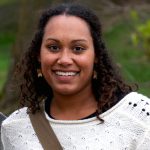
This Forum Update was provided by Hannah Scates Kettler, Digital Humanities Librarian, University of Iowa Digital Research and Publishing.
Let me begin with a big ‘thank you’ to the generosity of the DLF community and its organizers. With their support, I was able to attend this year’s DLF Forum as an Underrepresented Groups Fellow. This was not only my first DLF Forum, but also my first trip to Atlanta; well worth it. There was an added bonus (intentional?) that the Taste of Atlanta was happening right outside of the conference center.
The agenda for my first DLF Forum, other than eating as much of the wonderful food as possible, was to pretend I had only a superficial knowledge of digital libraries. It’s not a huge stretch for the imagination, as I’ve only been a part of the library scene for a couple years. So, I developed a narrative out of the different talks and workshops available during the three days in Atlanta: I am a new librarian with skills that range from, say, 3D modeling to metadata (skill expertise also ranging) who has way too many competing priorities and… wait that sounds a little like the intended audience for the introduction by Robert Cartolano, and Bethany Nowviskie’s keynote Who is Johannes Factotum?
Welcome, you are not alone. We were all there at some point.
The welcome was very gladly received, and I for one felt an immediate sense of professional camaraderie.
Regardless if the narrative was made up or reflected actual experience and anxieties, I thought it best to begin at the beginning. How is a digital library born in an ideal world? A world where we’ve already determined what types of data we want to present, one where we’ve had time to actually think and discuss and plan our digital library. In this ideal world, we would start with the development of our digital library infrastructure moving to project management and user-centered design approaches and ultimately, what lays beyond the presentation of digital surrogates; fostering and supporting scholarship based on these collections we’ve meticulously, efficiently and beautifully built.
It was helpful to develop a narrative-esque progression throughout the Forum. For one, it allowed me to choose the sessions (because, naturally, I wanted to go to them all!) and it allowed for a focus and mindset that did not leave me overwhelmed at the end of extremely busy and information-laden three days. I would go so far as to recommend that for those who are new to the Forum. Develop a narrative for your progression, it will make choosing your sessions easier, and you’re probably more likely to remember what happened than if you just attended random events.
I would also like to commend the efforts made by DLF to foster a community and openness by offering the fellowships and the Cross-pollinator grants. Not only is DLF actively supporting the diversification of the professions present, but also the perspectives that are inherit in a more heterogeneous group of people. This point was more eloquently presented by Bonnie Tijerina during the closing keynote.
I would be remiss as a fellow if I did not also encourage people to think about why DLF is offering these opportunities for people, and to actively talk about why the Underrepresented Groups fellowships and Cross-Pollinator grants were created. Just food for thought. I’d be happy to talk further about the positive changes DLF has made. It’s a really exciting and encouraging endeavor. I’ll be around for other DLF Forums for sure, so let’s talk. Let’s continue to define what a ‘digital library’ entails and what it means for our digital heritage.
